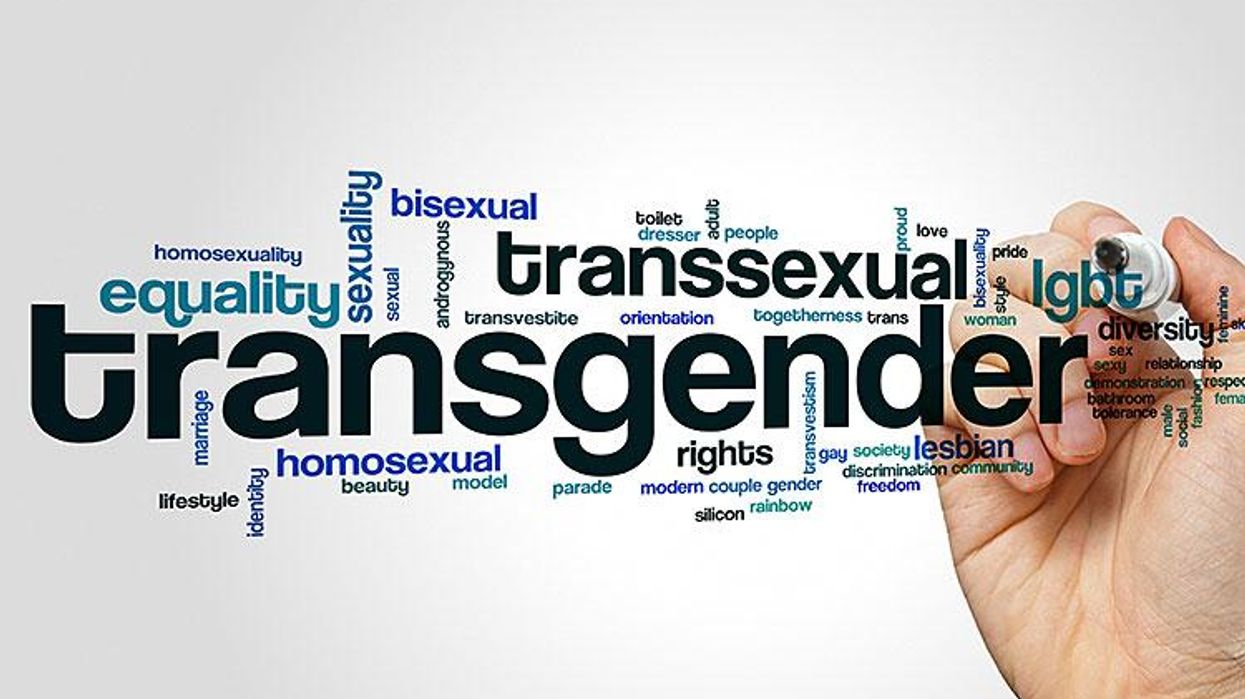I was talking last year with a woman who ran a large public company, and she was discussing her son, who she explained was nonbinary and used them/they as pronouns. I asked how long they had been transgender, and she replied, "Oh, they's totally straight and male with a girlfriend -- they just hates male/female categories and says that gender binaries are so over."
My first response was, "Oh, my God -- we've gone too far!" But upon reflection, I realized a profound shift was taking place, and a fundamental question was being posed.
As writer-activist Dana Beyer points out, "the 'trans' in transsexual was about moving from one thing to another." One was going from male to female, or vice versa.
This concept was more or less unconsciously grafted onto transgender. It's an overused description that "transgender" is a broad "umbrella" term for all those people who are gender-nonconforming -- transsexuals, cross-dressers, drag people, stone butches, etc. And a political movement grew up to represent these people and their political interests.
Alas, this is not and never was true.
While we're no longer supposed to use the term "transsexual," what we have and have always had is a transsexual movement, about one's right to change sexes.
On one hand, think of most of the main issues that animate this movement: the right to use the correct bathroom, to serve openly in the military, to get name-change corrections, to not lose one's job when transitioning (or when outed!).
These are all important and necessary things, but what they have in common is that they are all related to changing from one sex to another (or, if you prefer, to having one's correct gender recognized).
On the other hand, you cannot find any transgender or LGBT organization of any size that ever mentions stone butches, drag people, or cross-dressers. For political purposes, they don't exist. So, not much room under that umbrella.
This is particularly unfortunate for cross-dressers, who pretty much founded what grew into the modern transgender movement and created many of its earliest institutions, and then had to stand by and see themselves left behind by it.
Now the transgender movement is being challenged by those who identify as nonbinary and genderqueer. But are these people transgender?
Transgender has also been about some sort of biological anchor, a difference between one's perceived or presented gender expression and one's inner gender identity, a dissonance or, to use the old psychiatric term, "dysphoria."
But with genderqueer and nonbinary people, it is the identifying act of saying one is nonbinary or gender-nonconforming which is central to identity. Can one be transgender if one is not "really" transgender? Is the simple act of identification enough?
And even if we do include such people within the transgender movement, as Beyer has asked, how would you operationalize that politically? What bathrooms do nonbinary people want the right to use? How do they want to be integrated into the military? What category (or categories) do they seek to have government-issued ID?
Many years ago, some transsexuals started identifying as intersex. In a way, this made sense, both because there is probably a cross-sex biological aspect to being transsexual, and because society still views us as some kind of third sex--a practice at least some intersex activists have embraced.
Most trans people stopped doing this when intersex activists (rightly) complained that it functioned as an appropriation, and in any case caused too much confusion.
Yet it may be that with the emergence of trans people who identify as a nonbinary or, in many places, a third sex, their political interests will overlap and intersect. Perhaps that will include things like removing gender from government IDs, etc.
Which brings up another interesting question with which trans politics will need to wrestle eventually: If being transgender implies some sort of conflict within one's self -- and not necessarily just with social norms -- are nonbinary people cisgender?
Put another way, if I identify as "they" and "them" and have no desire to change my body or wear any sex's clothes, am I nonbinary, perhaps even genderqueer? Am I cisgender? Am I still "trans?"?
Whatever the answer to that question, it's becoming clear that we are seeing the limits of the discourse on transgender coming into focus. What comes next, what takes its place, is going to be very interesting. We are unconsciously and finally treading toward the end of gender. In my opinion, that step is long overdue.
RIKI WILCHINS's newest book is TRANS/gressive.















Charlie Kirk DID say stoning gay people was the 'perfect law' — and these other heinous quotes
These are some of his worst comments about LGBTQ+ people made by Charlie Kirk.